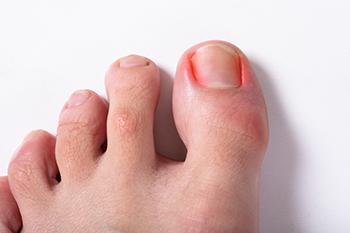 When a toenail grows into the skin surrounding it, an ingrown toenail forms. Ingrown toenails affect people of all ages. They can be painful and cause swelling and redness in the skin around the nail. Ingrown toenails may be caused by nails that are trimmed too short, wearing shoes that are too tight, or being born with an inherited curve to your nail. Symptoms typically progress from discomfort at the end or sides of the nail, to irritation of the surrounding skin, to steady or worsening pain, to possibly a callus developing, and— if the ingrown toenail is not treated properly—an infection. If you, your child, or your elderly loved one develop an ingrown toenail, it is suggested to seek treatment from a podiatrist to reduce the risk of an infection and to help the toenail grow normally again.
When a toenail grows into the skin surrounding it, an ingrown toenail forms. Ingrown toenails affect people of all ages. They can be painful and cause swelling and redness in the skin around the nail. Ingrown toenails may be caused by nails that are trimmed too short, wearing shoes that are too tight, or being born with an inherited curve to your nail. Symptoms typically progress from discomfort at the end or sides of the nail, to irritation of the surrounding skin, to steady or worsening pain, to possibly a callus developing, and— if the ingrown toenail is not treated properly—an infection. If you, your child, or your elderly loved one develop an ingrown toenail, it is suggested to seek treatment from a podiatrist to reduce the risk of an infection and to help the toenail grow normally again.
Ingrown toenails can become painful if they are not treated properly. For more information about ingrown toenails, contact contact one of our podiatrists of The Foot and Ankle Associates of North Carolina, PLLC. Our doctors can provide the care you need to keep you pain-free and on your feet.
Ingrown Toenails
Ingrown toenails occur when a toenail grows sideways into the bed of the nail, causing pain, swelling, and possibly infection.
Causes
- Bacterial infections
- Improper nail cutting such as cutting it too short or not straight across
- Trauma to the toe, such as stubbing, which causes the nail to grow back irregularly
- Ill-fitting shoes that bunch the toes too close together
- Genetic predisposition
Prevention
Because ingrown toenails are not something found outside of shoe-wearing cultures, going barefoot as often as possible will decrease the likeliness of developing ingrown toenails. Wearing proper fitting shoes and using proper cutting techniques will also help decrease your risk of developing ingrown toenails.
Treatment
Ingrown toenails are a very treatable foot condition. In minor cases, soaking the affected area in salt or antibacterial soaps will not only help with the ingrown nail itself, but also help prevent any infections from occurring. In more severe cases, surgery is an option. In either case, speaking to your podiatrist about this condition will help you get a better understanding of specific treatment options that are right for you.
If you have any questions, please feel free to contact one of our offices located in Ahoskie, Durham, Raleigh, and Rocky Mount, NC. We offer the newest diagnostic and treatment technologies for all your foot care needs.

